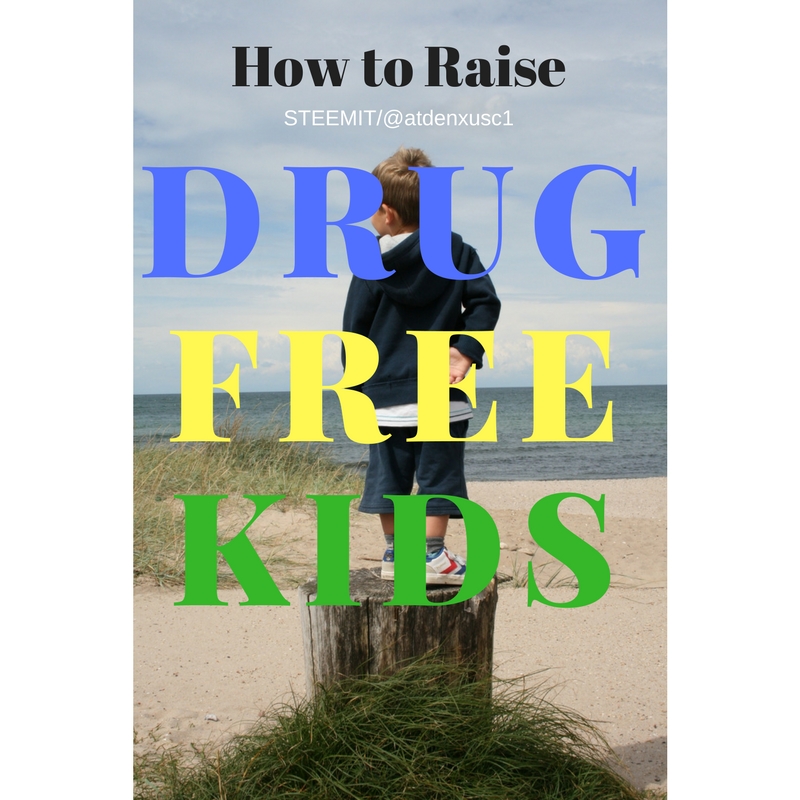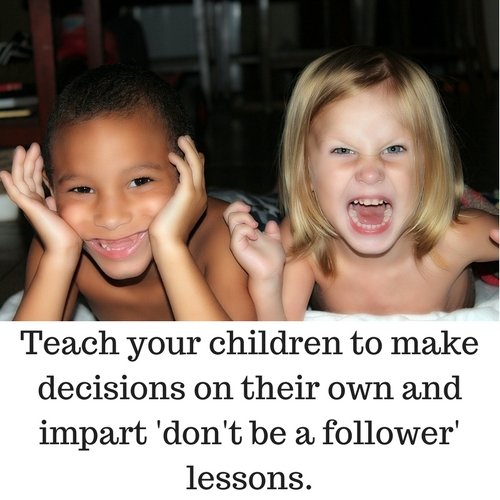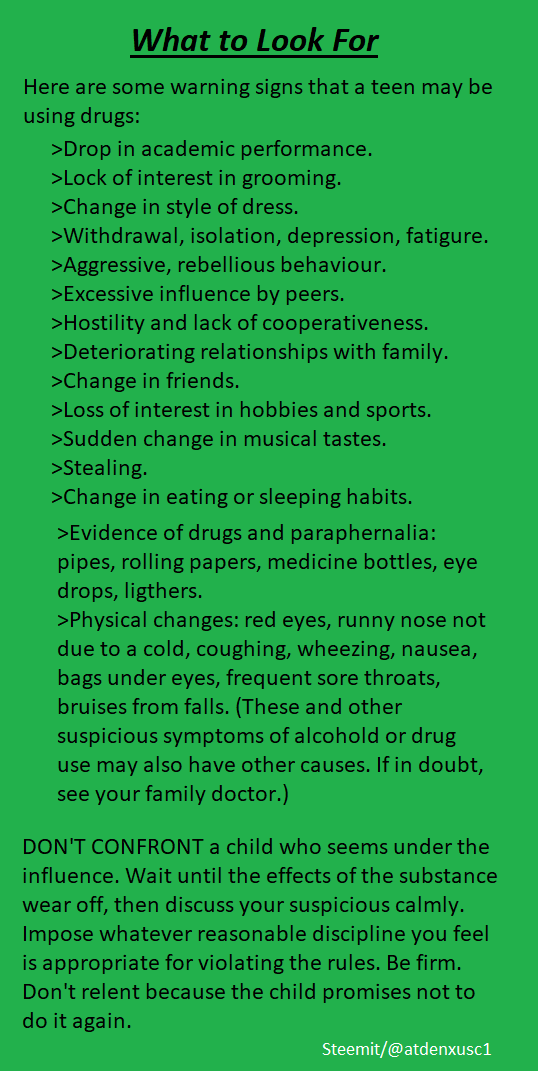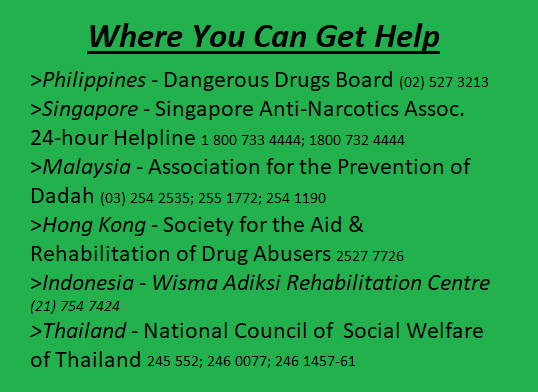How to Raise DRUG-FREE KIDS

This year millions of young Asians will use drugs. In Manila in 1998, one in every five known drug abusers was aged 15 to 19, according to one study on drug use in Southeast Asian cities. In Bangkok, in the same year, 15 percent of drug abusers were adolescents; in Kuala Lumpur, the figure was 8 percent. The news in Indonesia is even grimmer. Drug counselors estimate that at least 25 percent of Jakarta's public secondary school students take illicit substances regularly. The situation, according to Christian Kornevall, United Nations Drug Control Programme (UNDCP) representative for East Asia and the Pacific, is "terrifying."
Dato Haji Jumaat, the secretary general of PEMADAM, the Association for the Prevention of Dadah (drug abuse) in Malaysia, says one reason for increased drug use among children is that parents lack basic education about drugs. "Many are unaware of the prevalence of illicit substances and the risks their children face," he says.
Fortunately for the many parents seeking help, much is known about preventing drug abus. What follows is the latest and best information on what you can do to help your child.
A Good Beginning
When Linda and Jay Reyes of Manila were married in 1973, they talked about how their kids should be raised. Both, Jay, then 21, and Linda, 17, had grown up in an age when almost everyone they knew was involved in drugs. "They were hard to avoid because of peer pressure," Linda recalls. "It was the 1970s, and you were called square if you weren't into drugs." Then one day a police informer who Linda and her friends knew was killed by drug dealers. It proved to her that drugs were bad news. Together, Linda and jay made a commitment to do whatever it took to raise their children to be drug-free.
Early steps. A parent's actions even before a child's birth are critical to helping that child stay off drugs in later years. Drugs, including nicotine and alcohol, can cross the placental barrier and damage a fetus as early as three weeks after conception. And some research suggests that babies born to addicted mothers may be at higher risk of addiction later in their lives.
In addition, experts agree that loving attention is important in developing lifelong self-worth - and that lack of self-worth is a major reason for drug use. Long before your children are ready for school, establish family guidelines for behavior: honesty, fairness, respect for others and for the law.
First lessons. As soon as they're old enough to understand, teach your children that some products found around the house, including household cleaners, aerosols and medicines, can be poisonous.
When the Reyes' son, Joey, developed asthma at the age of six their other children, Michelle and Jay Bee knew his medicine was off-limits because of the lessons they had been taught as toddlers. When their daughter Bianca was born a year later, Linda ensured she grew up learning the same lesson. Drill it into your kids: "Don't ever swallow anything new without talking to me first."
Primary School
Children five to nine years old still learn mainly by experience. They can slide from facet to fantasy and back again without even realizing it. What they see, however, is very real to them. Though teachers often achieve hero-like status, it's what children encounter at home that counts the most.
"What young children see is more important than what they're told," says Dr Lau Sing, the director of the Centre for Child Development at Hong Kong Baptist University. If children see their parents drinking and smoking, he adds, they're more likely to follow that example.
Most experts agree that it's OK if your kids see you having an occasional drink. But if they see you using alcohol as a regular coping mechanism, it's not. Moreover, don't involve your children in your drinking by having them make you a cocktail or bring you a beer.
Good choices. Now is when to begin teaching your children to make decision on their own, and to impart "don't be a follower" lessons.
"Parents should begin to teach their kids about peer pressure before they're seven," says Nannies Wiryoatmodjo, a Jakarta school principal, drug counselor and mother of five. She tries to make children understand that just because someone tells them to do something, that doesn't mean it's the right thing to do. If they're in doubt, she says, kids should ask someone they trust.
By the late primary-school years many children know of classmates who have begun to smoke, drink or use drugs.

Sniffing dangers. Now is also when kids begin to encounter inhalants: pressurized aerosol products such as paints and cooking sprays or model glue. Kids inhale these volatile substances in order to experience a high. The fact that the momentary "buzz" can cause permanent brain damage, even death, doesn't occur to these youngsters.
One of the most important lessons parents can teach their children at this age is how to say no. Linda and Jay Reyes, who own and manage several poultry farms, remind their kids that many addicts squander their family's savings to support a habit. "The best thing parents can do is explain to their kids that they work hard for the family and ask their kids not to let them down," says Linda. This way kids, when offered drugs or alcohol, can always say, "No way. My mother would kill me."
Escape routes. Help kids stay away from places where they may be pressured to use illegal drugs. If there's a party, they should ask, "Who else is coming?" and "Will your parents be home?" As a last resort, tell your kids if they sense trouble brewing, they should make an excuse to leave. Often the easiest and best option is to walk away.
.jpg)
Chief Inspector Wong Chun Chin of the Hong Kong Police Force tells kids in his precinct that if their friends start experimenting with drugs, it's time to join another group.
Teach your children to be aware of how drugs and alcohol are promoted. Kids nearing their teens are increasingly turned in to TV, movies and music that bombard them with images of drug and alcohol use. K. C. Wong, a Singapore social worker, keeps tabs on what his children watch and listen to. "You have to keep your guard up," he says. Parents should also monitor their kids' computer programs and what they are accessing on the Internet.
Linda Reyes says she often watches television with her kids. If she sees a scene that depicts drug use, she will use it to press her message home. "I say: 'See what drugs can do?' It's just one sentence, but it gets into their heads and it isn't nagging."
How do you talk to your kids about drugs? Start anywhere, advises Nannies. Don't worry about how you kick off the discussion, and don't get discouraged if it seems your kids aren't listening. Make one thing crystal clear: you feel strongly that drugs are dangerous, and you do not want your child to use them.
Rising Teens
This is probably the most vulnerable period in a child's life, a time when peer pressure hits with a vengeance. Their hair gets longer or maybe disappears. Their clothes are bizarre, their music funky. Hormones are bubbling, kids this age are curious about everything-and willing to try just about anything that they think will make them look cool.
"Many young adolescents desperately want to be grown ups," says Lau. However, kids at this age often feel held back by overprotective parents and teachers. This can create rebellious teens. "What they really need is lots of love, attention and sharing," Lau says. Adds Tan Seek Kang, the director of the Central Narcotics Bureau of Singapore, "Listen to children's views and ideas, and give them responsibility at home. Teach them that saying no to drugs is a sign of maturity."
Facts vs. fear. Lau believes that mature kids need facts while immature kids need a balance between facts and penalties if they are going to resist the peer pressure and temptations around them. Most experts agree, however, that scare tactics not the way to go.
Many messages kids hear are designed to frighten them. They are told, "If you take drugs you'll become an addict." Says Kornevall, "This makes it difficult to communicate right and wrong with young people. They're not receptive to scare tactics because they've tried drugs or know someone who has and, hey, the result was not they became addicts or died."
One teen reported coming home after having smoked some pot at a party. "My parents said things like, 'You're going to be a drug addict and die.' They didn't have a clue about drugs." Without intending to do so, his parents had closed the door to further discussion.
"Teenagers are well-informed," says Prateep Ungsongtham Hata, the secretary-general of the Duang Prateep Foundation in Bangkok, Thailand. He adds that the information is available for parents too, but they need the desire to be informed. Armed with good information, parents can speak accurately about what drugs can do.
Keep advice factual and in the here and now. Talking to young teens about long-term health threats doesn't have much effect. Kids are concerned with looking good to their peers. Point out that cigarette smoking causes bad breath and could give them yellow fingers, or that if they drink, they might become ill and throw up in from of their friends.
Setting limits. Many young people use drugs simple because their friends do. To reinforce a child's ability to resist, get to know your child's friends and their parents, and monitor your child's whereabouts.
Steering children towards the right crow is not always easy. Declaring a friend "off-limits" may only make that person more appealing. Dr Mohd Shauib Che Din, the deputy chairman of PENAWAR, a support group for families of addicts in Malaysia, says getting to know your children's friends and their parents is the key to keeping them away from drugs. "If your children ask to stay overnight with a friends, don't let them go unless you know the other family well."
Keeping busy. Research has shown that when teens are unsupervised and have little to do, they are more likely to experiment with drinking and drugs. Keep children involved and busy.
Dato Haji Jumaat and Dr Shuaib believe that most of Malaysia's drug problems are found in its new satellite towns and land schemes, areas where youngsters have plenty of time and little to do, and are bored.
K. C. Wong warns that children are at greater risk of drug use if they spend time with other bored, unsupervised kids. "It's best if they join youth groups rather than hang around the neighborhood." Extracurricular activities, volunteer work and chores at home keep kids busy and add to their sens of responsibility.
Staying involved. Scientific research has shown that direct parental involvement in the life of the child is the most protecting factor in increasing the odds that a kid will remain drug-free. "Give enough time, care and attention to your children," says Lilia Dulay, the chief of Preventive Education, Training and Information at the Dangerous Drugs Board of the Philippines, "and the odds increase tremendously that they won't use drugs."
"We are living in a society where parents and the extended family have less time to devote to youngsters," says Hata. "The pressure to earn more money means parents often work long hours and see little of their children. This lack of quality and quantity of parental involvement is the most crucial factor in the increase of drug use." In short: Parents must be involved in their children's lives.
Dato Haji Jamaat says parents should understand that in most Asian countries school drug prevention programmes are either limited or non-existent. Parents should help develop other programmes that cater to the need of youngsters and positively channel their energy.
The exceptions are Singapore and Hong Kong, both of which have extensive drug-education programmes. Both cities have also recorded a drop in the number of youngsters caught taking drugs. According to the Singapore Anti-Narcotics Association, the number of new addicts dropped from 1134 in 1997 to 769 in 1998.
Young Adults
Peer pressure still holds sway. Being accepted as on of the gang is a top priority. And susceptibility to influence and exposure to drugs and alcohol may be even greater that it was during the earlier teenage years.
This is also the time kids begin smoking, a habit experts call a "gateway" to drugs. "If a kid is wiling to try cigarettes, they are willing to try beer, then pot. It can be downhill from there," warns David Djaelani Gordon, a recovered addict and now a drug counselor in Jakarta.
Older teens have a better awareness of the "future consequences of their actions. Kids this age need to be reminded that as bad as drugs and alcohol are for their bodies, what those substances can make them do can be equally dangerous. Inspector Wong says that in Asia drugs can quickly lead teenagers into crime. "They begin taking drugs and then have to start stealing to support their habit." Dato Haji Jamaat stresses that kids should be told that drugs will lead them into the poverty prevalent in most Asian cities. "The injecting, the squalor, are the ugly visions behind drug-taking. Kids need to be shown drugs are not glamorous," he says. Other experts believe that kids learn even more when they hear about the perils of addiction from those who have walked that road.
One question that troubles many parents is: "What can I say to my children if I took drugs when I was younger?" The answer is be honest. You did it and it was wrong -- be an adult and say so. Setting rules for a child is only half the job, says Dr Shuaib. Parents must also be prepared to enforce the penalties when the rules are broken. Experts recommend: Be specific. Make sure your child knows what the rules are, the reasons for them and what the consequences will be if they're broken. When your youngster passes a driving test, warn him: "If you ever drink and drive, you can say goodbye to driving the family car again. There will be no second chances. Once, and it's over. You're too important to lose." Jay Reyes says his approach has worked with his children.
Be consistent. "Just saying no" can be as hard for parents as it is for a child. Sometimes caving in to a persistent request is the path of least resistance. But if the answer to a request should be no, stick to it.
Be reasonable. Don't add new consequences after a rule is broken, and make sure the punishment is appropriate. "We all make wrong decisions every day," says Inspector Wong. "So if our kids make one wrong decision we have to accept it and help. If parents act as if it's the end of the world, it makes the situation worse."

Keep listening. According to Gordon, the most effective way to communicate with children about drugs is to "listen to their hopes, fears and dreams." If you listen carefully to them and read between the lines, you can learn a lot about what they think about drugs -- and help them avoid the pitfalls.
To keep children away from drugs, one thing is clear: schools, community, religious institutions, the police -- all of them can help. But no-one can replace the family.
Linda and Jay Reyes invested a lot of time fulfilling their commitment to raise their children to be drug-free.
It has paid off -- none of their four children has fallen prey to drugs. "Knowing that I am blessed with a good family has helped me stay away from drugs," says Michelle, now working in Manila as a graphic artist. Joey, a third-year secondary school student, says "What use is a 30-minute high if you ruin the rest of your life?"
The work that parents do is critical. Most experts agree it is highly likely that youngsters who don't do drugs as teens will not do drugs as adults. Talk to your children. Listen to them. Set standards of right and wrong. Keep in mind that they learn by example. Love, support and praise them so they will have a sense of self-worth. Keep them busy. Be involved with -- and top of -- their lives. Educate yourself about drugs.
Remember, don't let your silence be acceptance.

Congratulation
Today 1 year ago you joined SteemItThank you, for making SteemIt great and Steem on for more years to come!
(You are being celebrated here)
Congratulations @atdenxusc1! You received a personal award!
You can view your badges on your Steem Board and compare to others on the Steem Ranking
Do not miss the last post from @steemitboard:
Vote for @Steemitboard as a witness to get one more award and increased upvotes!